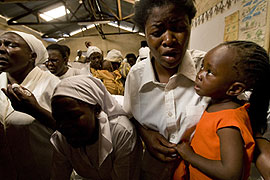Kenya opposition open to coalition
Raila Odinga rejects unity government but wants power sharing on his own terms.

Odinga, who claims Mwai Kibaki stole the presidential vote, told reporters on Sunday that he was ready to talk about sharing power, but only through a mediator empowered to negotiate an agreement that the international community would guarantee.
He welcomed the imminent arrival of John Kufuor, Ghana‘s president and chairman of the African Union, who is expected in Nairobi by Tuesday.
| Related | ||||||
|
Jendayi Frazer, the leading US diplomat on Africa, was in Nairobi talking to both Kibaki and Odinga, whom the US, Britain and the EU have urged to negotiate.
Desmond Tutu, the South African Nobel peace laureate, also took part in the negotiations.
The explosion of violence has damaged the East African nation’s image as a stable democracy and attraction for millions of tourists in a region wracked by wars, uprisings and civil unrest.
According to a government committee, 486 people died and 250,000 were forced to flee their homes in the upheaval over the disputed vote, only the second free election since Kenya’s 1963 independence from Britain.
Blame game
Al Jazeera’s Yvonne Ndege, reporting from Nairobi, said both sides of the political divide accuse each other of fuelling the violence by arming militias and calling on their supporters to carry out acts of civil disobedience.
The troubles eased over the weekend, although there have been isolated machete fights and ethnic attacks, and police fired tear gas to disperse protesters in the coastal tourist town of Mombasa.
|
Your Views |
| Send us your views |
Attempts to hold opposition rallies last week were blocked by police who fired tear gas, water cannons and live bullets over people’s heads.
Kibaki, re-elected by a narrow margin in a vote count that international observers say was deeply flawed, said on Saturday after meeting with Frazer that he was willing to form a unity government.
Odinga rejected that proposal, telling Al Jazeera’s Mohammed Adow that “Kibaki knows very well he lost an election”.
“I think it is like an insult to the people of Kenya by suggesting he is being generous with his offer of a national unity government,” he said.
Coalition, not unity
But his spokesman Salim Lone said the party was open to other solutions.
“A government of national unity is not acceptable to us,” he said. “But there are other formulations, such as a coalition government with genuine power sharing, that we are willing to discuss.”
He said his party differentiates between a unity government, where the president has considerable power, and a coalition government that has greater possibilities for power sharing and where Kibaki need not necessarily even be president.
 |
|
Unicef says many hospitals are in need of |
The other opposition proposal is to set up an interim government with a mandate to hold new presidential elections, he said.
Kibaki has said only a court could order fresh elections – an unlikely event since the judiciary is packed with his allies.
But it will be nearly impossible for Kibaki to govern without opposition support.
In a parliamentary election that was held the same day as the presidential election, Odinga’s party won 95 of 210 legislative seats, and half of Kibaki’s cabinet lost their seats – a sign of people’s anger over perceived pervasive corruption and nepotism that favoured Kibaki’s Kikuyu tribe.
Simmering resentment of the Kikuyus was ignited in the violence.
In the central Rift Valley that is Odinga’s stronghold, thousands of Kikuyus fled their homes over the weekend, escorted by soldiers down roads strewn with corpses and burned out vehicles.
Health crisis
Tens of thousands of people are hungry, cut off from supplies as the crisis has closed down shops and transport across Kenya. What food is available has tripled in price.
Wubeshet Woldermariam, Merlin’s country director for Kenya, said that humanitarian supplies were dangerously low.
“Food and clean water supplies are now running dangerously low, especially in and around [the western city of] Kisumu,” he said in a statement.
“People are being forced to drink unsafe water, risking diarrhoeal diseases, infection and dehydration. The longer the crisis continues, the greater the risk to people’s health.”
“If peace isn’t restored within the next few days, disease outbreaks and severe dehydration are very real threats,” the charity warned.
The United Nations tried to help on Sunday, sending 20 truckloads of grain and vegetable oil that had been stuck in the port of Mombasa due to fears of vigilante roadblocks and other insecurity.
The convoy of trucks left without an expected armed escort, but a police vehicle was seen racing to catch up, about 100km outside Mombasa.
The food was destined for some 100,000 people “who are in dire need” in Nairobi and in central Eldoret city, according to Lemma Jembere, a UN World Food Programme logistics officer.
Red Cross workers trying to distribute food on Sunday in Nairobi‘s Mathare slum were swamped by hundreds of people who crowded around their truck.
Police arrived to control the mob and food was handed out for a while, but the distribution eventually was suspended for security reasons.
The UN Children’s Fund, Unicef, said many hospitals in the disaster zones were in need of medical supplies to treat a wide range of injuries and conditions.
“Supplies and staff are needed to treat victims of shooting, burning, beating, slashing and trampling,” Sara Cameron, Unicef’s communication officer in Kenya, said.


